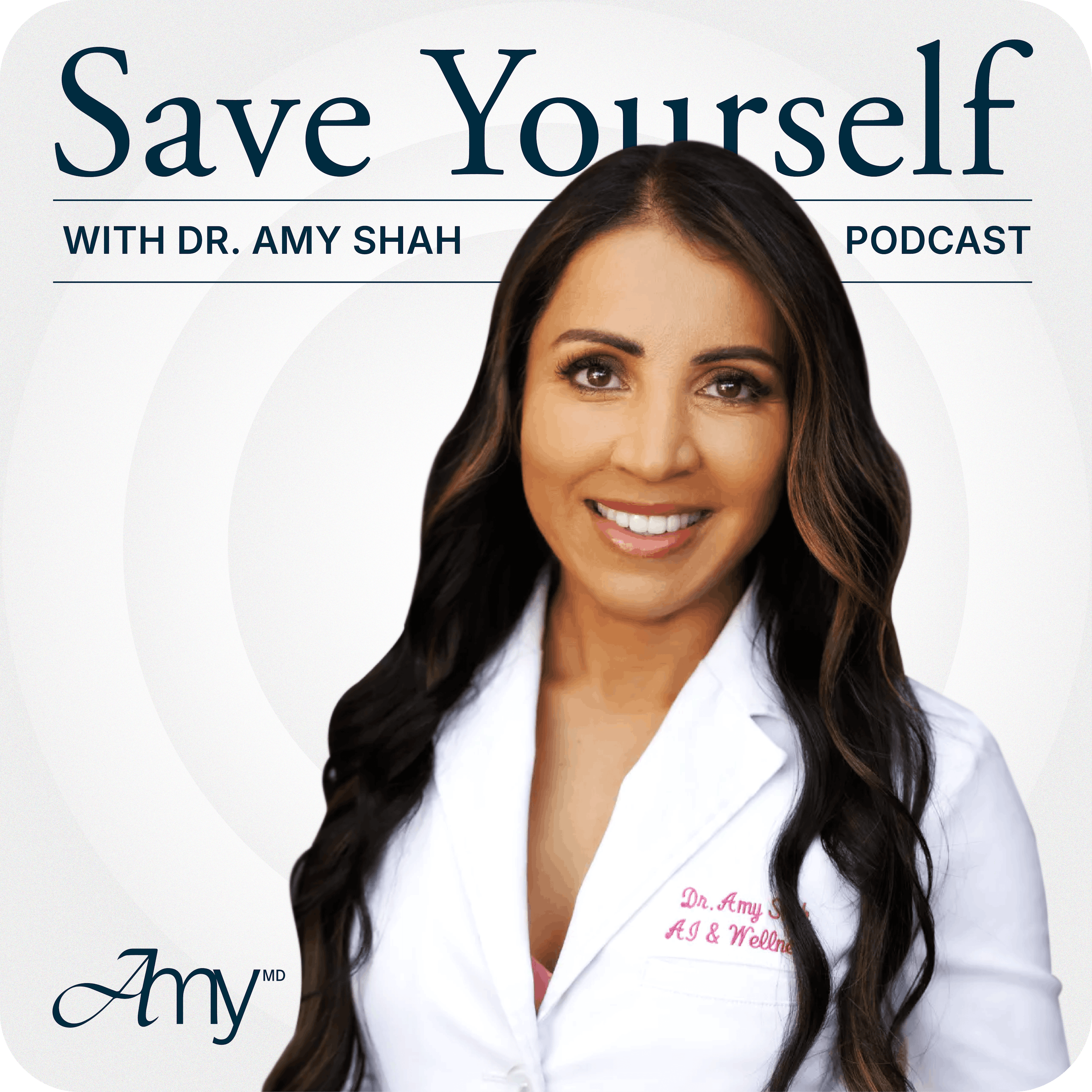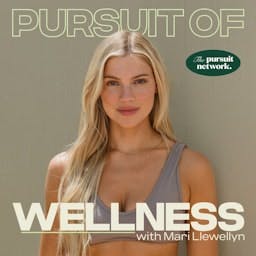.jpg)
Mindfully Integrative Show
Welcome to the Mindfully Integrative Podcast! We are dedicated to featuring inspirational and successful individuals who have embraced mindful investing to achieve optimal integrative wellness. Our podcast dives into all aspects of mindfully incorporating integrative functional health into our lives, aiming to help create a more balanced and fulfilling life. New episodes are released every Friday and cover a wide range of informative and entertaining topics, interviews, and discussions.
We explore a mindful approach to the mind-body connection with guests discussing various topics in integrative holistic health. This includes areas such as whole health, functional medicine, spiritual health, financial health, mental health, lifestyle health, mindset shifts, physical health, digital health, nutrition, gut health, sexual health, body positivity, family health, pet health, business health, and life purpose, among others.
Dr. Damaris G. is an Integrative Doctor of Nursing Practice, a Family Nurse Practitioner, a mom, and a veteran. For collaboration, interviews, or to say hi, you can contact her via email at damaris@mindfullyintegrative.com. You can also find her on LinkedIn at or https://www.linkedin.com/in/damarisdnp/. To join our membership and access resources, visit our website at https://mindfullyintegrative.com .
Please note that the information shared here is for informational and educational purposes only and should not be considered medical advice. Always consult with a physician or other licensed healthcare provider when making healthcare decisions. Enjoy the podcast!
Mindfully Integrative Show
Elevate Your Hydration: The Essential Role of Water and Electrolytes in Optimal Health
Unlock the secrets of optimal hydration with integrative family nurse practitioner Damaris Margaret Grossman as she shares her profound insights into the underestimated power of water for our health and wellness. Damaris recounts her personal health journey, emphasizing why water is not just a beverage but a foundational element for life itself, essential for bodily functions ranging from temperature regulation to waste removal. Discover the intricate balance our bodies aim to maintain through cellular homeostasis and the crucial process of gaining and losing water. Whether you're a science enthusiast or simply looking to enhance your everyday wellness, this episode offers a treasure trove of knowledge.
Damaris goes beyond the basics of hydration, shedding light on the vital role of electrolytes—sodium, potassium, magnesium, calcium, and chlorine—in maintaining fluid balance and supporting essential bodily functions. Listen as she explains how to discern the signs of dehydration versus overhydration and the varying recommendations for daily water intake tailored to individual needs. Packed with practical advice, she guides you on incorporating water-rich foods into your diet and adjusting your hydration strategy according to exercise, environment, and health conditions. Tune in to empower yourself with the knowledge needed to elevate your hydration game and overall well-being.
Sponsor Affiliates
Empowering Your Health
Get YOUR Own
Joburg Protein Snacks
Discount Code: Damaris15 Or Damaris18
Feeling need to Lose Weight & Become metabolically Healthy
GET METABOLIC COURSE GLP 1 REseT
This course is designed for individuals looking to optimize their metabolic health through integrative and functional medicine approaches. Whether you're on a GLP-1 medication or seeking natural ways to enhance your metabolic function, this course provides actionable steps, expert insights, and a personalized roadmap sustainable wellness.
Are you feeling stressed, tired, or Metabolism imbalanced?
Take advantage of our free mindful steps to help improve your well-being.
ENJOY ONE OF our Books
Mindful Ways Health Wealth & Life
https://stan.store/Mindfullyintegrative
Join Yearly membership ALL IN ONE FUNCTION HEALTH
Ask Us for help...
Hi, how are you? My name is Damaris Margaret Grossman and, if you don't know me, I am an integrative family nurse practitioner and I talk a lot about integrative health because it's affected my wellness and my health and I've had to find ways to get better and just things to you know, improve that and that's kind of my goal, so that people can find mindful ways each day. And today I'm talking about water. Does it hydrate you? What's the benefits of it? And, you know, do people realize that it's like so important? I'm going to tell you, yes, water is very, very important.
Speaker 1:It is like kind of like a foundational component to being healthy, nutritional um component to being healthy. Think of it more. Like um, the body is made up of like 60 to 70 percent water and we need to hydrate it. It's essential for body function. You know just like breathing and you know um cellular function and the bloodstream. So it's like it helps regulate um. It helps with temperature regulation, helps with bodily functions, lubrication in the joints. You know nutrient trans um nutrition transport. You know waste removal from like constipation. You know hydration is very important in the body.
Speaker 1:Now, how is it done? You know, first, it can be absorbed. You know it can be absorbed, you know, through the intestines, um there's insensible, insensible ways, so um it can be distributed and travel through the bloodstream. It can do be coming in through cellular um function, um, and that enables it through biochemistry or cellular homeostasis, which is the body's way of balancing out. And that's what you're trying to do. You're always trying to get yourself into as much optimal state as possible of what your body will allow and then you can excrete it. So it can be excreted through sweat, urine and respiration. So you lose it and you gain it and you know you're always trying to kind of regulate it. So what are roles for hydration and what are things that we want to use in addition to water? So H2O is, you know, hydrogen and oxygen ions, but additional to that, to help, you know, bring in the water into the cells, you do need electrolytes. So why do you need electrolytes? And what are there? So the electrolytes are sodium, potassium, magnesium, calcium and chlorine. So sodium regulates the fluid and balance of nerves transmission. Potassium helps with supporting muscle contractions and the heart function and it also they also help with um. The sodium potassium pumps open and regulate cell cell um cellular function and um hydration. Magnesium helps with muscle relaxation and many enzyme activity within the body. So there's multiple methods with magnesium. Calcium is essential for, usually for muscle contraction and bone health and other functions. Chlorine maintains fluid balance and a digestive health. For the most part, that's what these electrolytes do and in turn will help bring in homeostatic state within the body.
Speaker 1:When it's imbalanced, you're either dehydrated or overhydrated. Dehydrated is like think dark urine, fatigue, dry mouth, overhydrated, your nausea, cramps and muscles. Now each person their need for hydration. Think, on average, about 64, about eight ounces of water. Give it um 64 ounces of water a day, cups give or take. If you're getting really regulated you can get to about 80 to a hundred. So think like half your body weights, over 150, you can get to about 75 ounces of water and you're doing pretty good.
Speaker 1:You know everything they eat. Has you know some sort of food of water? Not everything, but like watermelon grapes? Um, they eat. Has you know some sort of food of water? Not everything but like watermelon grapes, soups, you know, and your foods. So general recommendation, it's about half your body weight.
Speaker 1:I'm not saying that's everyone you know. Obviously, if you have some kidney functions or other health issues, that may not be possible to bladder issues. You know that may not be possible, but give or take, that's that. And then you know, with exercise, where you live and your health conditions, that needs to be regulated. But would you believe, most people really only get like one or two glasses of water in ways to hydrate and foods that are really big in water hydration are cucumbers, watermelons, grapes, celery, oranges, those kinds of like um, um, great. There's a couple others that maybe have higher. You know I'm not sure what your benefit ones are that you like, but you know those are some that I like, um, I enjoy, uh, coconut. It has a deep rich in potassium, but with that you still have to, you know, modify like, um, how much you give, especially to kids and to adults with cardiac issues, but you know it's still very helpful.
Speaker 1:Teas, teas that don't have a lot of caffeine, chamomile, peppermint, of that nature. You can make your own. I have a couple of recipes online and also that I write with sometimes electrolyte drinks and then electrolytes to help with cortisol. You know, think of it like when you're adding in these you have your baseline amount of water, a little sea salt, orange and honey. Very helpful for filtering out the kidneys, helps also with cortisol levels, but you know this varies for each person so I can't say it's one size fits all. But you know a little bit of an electrolyte could go a long way Ways if needed. Obviously you can add in magnesium, potassium and electrolyte tablets Like some.
Speaker 1:They have so many out there now I mean main ones is make sure it just doesn't have a lot of crap in it. You know there's. Make sure it's just, you know, a quality brand and we reasons why. You know you want to kind of like drink daily and how to do it through the day I always recommend like a uh straw kind of cup or when you're exercising, make sure you're hydrating. Then um, and limit like the amount of like alcohol, coffee and sugary drinks, cause that will dehydrate you more and take away your um high. Already tracking, like you know, and then ways to even um improve your hydration is I have like little straw cups throughout the house, um, my work and my car, so I can kind of get myself into the routine of really drinking. And you know um, there are apps now that help you track there, even water bottles to help you track.
Speaker 1:So every little bit you know will make a difference and will actually improve even your general health, joint pain and things, without even going into supplements and such. You know let's just start simple. So a little bit of water goes a long way. You know our body needs it, and just keep it simple. Sometimes, you know, even if it's just water with a little bit of sprig of some salt or lemon, you know, even if it's just water with a little bit of sprig of some salt or lemon, you know that that could be so helpful. I hope some of this is useful and you find a mindful way each and every day. Have a wonderful day.
Podcasts we love
Check out these other fine podcasts recommended by us, not an algorithm.

The Dr. Hyman Show
Dr. Mark Hyman
Functional Fertility with Dr. Kalea Wattles
Kalea Wattles
On Health for Women
Aviva Romm
Save Yourself With Dr. Amy Shah
Dr. Amy Shah
Huberman Lab
Scicomm Media
The Peter Attia Drive
Peter Attia, MD
The Metabolic Classroom with Dr. Ben Bikman
Insulin IQ
FoundMyFitness
Rhonda Patrick, Ph.D.
Change Your Brain Every Day
Dr Daniel & Tana Amen
The Dr. Josh Axe Show
Dr. Josh Axe
Pursuit of Wellness
Mari Llewellyn & Pursuit Network
Feel Better, Live More with Dr Rangan Chatterjee
Dr Rangan Chatterjee: GP & Author
The Level Up Podcast w/ Paul Alex
Paul Alex Espinoza
Faith Over Fear
Jennifer Slattery, Faith Over Fear Author and Speaker
